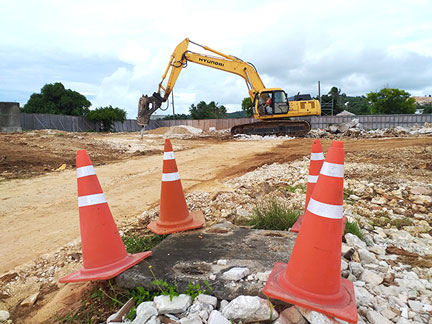Streamlining project approval processes sought

A worker operates the truck drilling machine at the demolition site of the Northern Marianas College where new buildings will be constructed through federal grants. (Contributed Photo)
The Governor’s Council of Economic Advisers has emphasized the importance of getting various projects off the ground as soon as possible to help the CNMI get through the COVID-19 pandemic and fast-track the islands’ recovery from the crisis.
In response, Gov. Ralph DLG Torres said that government agencies will help facilitate in the processing of key projects.
“Our recovery requires a whole-of-government approach that modernizes our permitting processes to ensure that federal grants are expended efficiently and recovery projects are executed effectively. Lt. Gov. [Arnold I.] Palacios and I have already instructed our departments and agencies to prioritize the execution of these projects by streamlining the permitting process in order to strengthen our infrastructure, rebuild homes, and create job opportunities for our residents,” Torres said.
Mike Sablan, who chairs the GCEA’s Domestic Policy Recovery Committee, said the immediate expenditure of the $300-plus million in COVID-related grants plus more than $400 million in Yutu and Mangkhut disaster relief funds will have a multiplier impact on the economy, which is crucial in these difficult times.
“Hundreds of millions of dollars for disaster relief projects will soon become available, some as early as November or December this year. They will go toward typhoon repairs and mitigation efforts to harden facilities, homes, and infrastructure. And, just as important as the repairs are, the economic impact of infusing these millions of dollars into our community in the coming months amidst all the challenges we face cannot be overstated, nor ignored,” Sablan said.
These projects and the funds that will be spent in completing them will provide the CNMI the needed economic activities, while waiting for the reboot of the tourism industry.
“We know that tourism will return to our beautiful islands, but when? Which means we also don’t know when our tourism sector can safely ramp back up and regenerate the jobs and tax revenues we need. And how much longer can our government continue to provide essential services without an economy to speak of?” Sablan said.
With the disaster relief funds and pandemic grants, Sablan said the CNMI will have the means to move forward and must capitalize on these opportunities by getting projects off the ground without unnecessary delays. This can be done by improving efficiencies and streamlining processes in procurement, permitting, and contract management. He added that these improvements can be implemented without compromising the importance of fair procurement practice, protecting the environment and natural resources, and complying with grantor requirements.
Under the current system, Sablan said the timeline for projects, beginning from the funding approval all the way up to the issuance of permits to start construction is 29 months, including resolving legal disputes, if there’s any. The process will take longer if legal issues are not settled quickly.
Joe Guerrero, a local businessman and member of the GCEA Fiscal Economic Diversification, said a reasonable timeline for permitting would be between four and five months (from the usual eight months) plus 12 months, the most, for procurement (20 months norm). He added that in certain states, there are programs available to aid in the permitting and if the CNMI can replicate that, especially for COVID-19 and Yutu-funded projects, it will make a significant impact to the islands’ economy.
Jerry Tan, who co-chairs the GCEA with Torres, calls the improvement in the approval processes a “game changer” not only for the pressing projects today, but also in the future as the upgrade will boost investors’ confidence to the CNMI and its efficient system of conducting business with both the private and public sectors, helping bring to the islands’ the quality investments its aiming for.
Meanwhile, the GCEA acknowledged the groups and individuals who helped secure these grants and provide immediate assistance to the community. Sablan said it’s unimaginable how we could have weathered the storm without the CARES Act funding for COVID-related emergency needs, such as stimulus checks, PPP subsidies, Small Business Administration loans, unemployment assistance, and others.
“The unprecedented impact the pandemic has brought upon our government, economy, and community continues to test our resiliency like never before. I know it was no easy feat for agency staff to navigate complex, uncharted processes to get over $300 million in COVID-related benefits into our community and help keep our economy afloat,” Sablan said. (PR)























